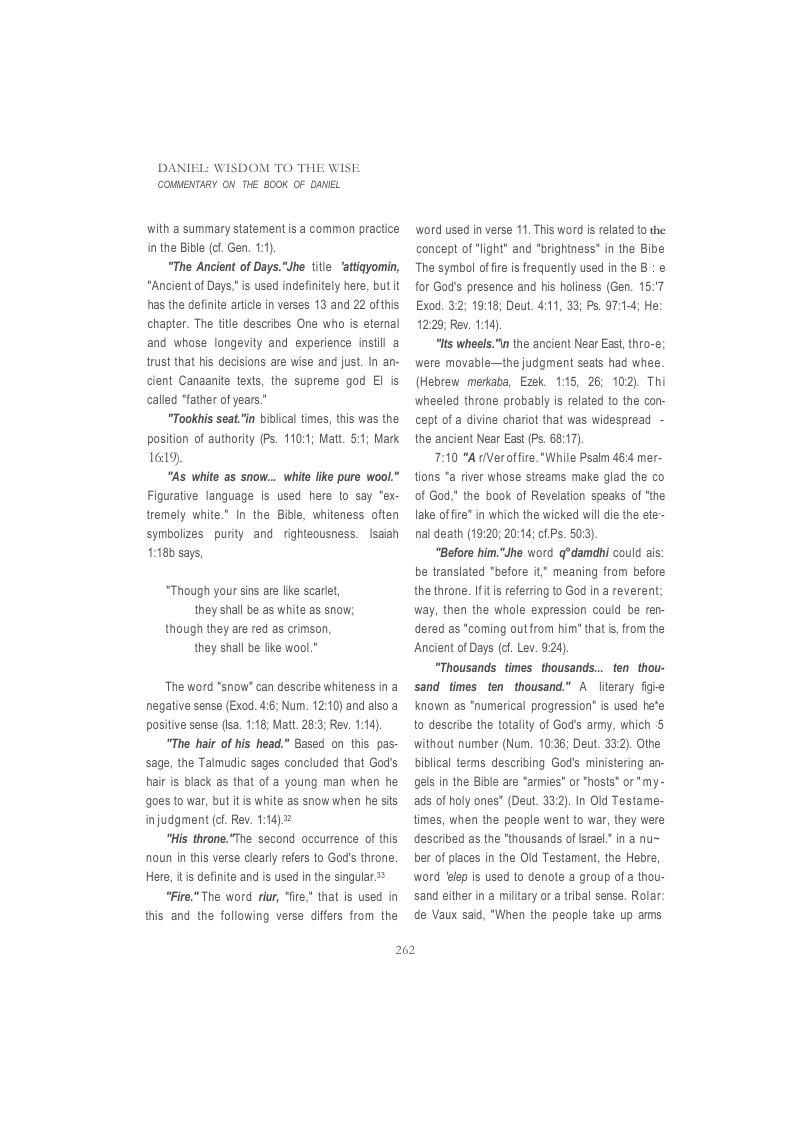Zdravko Stefanovic (SDA) identifies the "Ancient of Days" with God the Father in his exegesis of Daniel 7.
- Type
- Book
- Source
- Zdravko Stefanovic Non-LDS
- Hearsay
- DirectSecondary
- Reference
Zdravko Stefanovic, Daniel Wisdom to the Wise: Commentary on the Book of Daniel (Nampa, Idaho: Pacific Press Publishing Association, 2007), 262, 266, 272, 278-79, 281, 287, 290
- Scribe/Publisher
- Pacific Press Publishing Association
- People
- Zdravko Stefanovic
- Audience
- Reading Public
- Transcription
"The Ancient of Days." The title 'attiqyomin, "Ancient of Days," is used indefinitely here, but it has the definite article in verses 13 and 22 of this chapter. The title describes One who is eternal and whose longevity and experience instill a trust that his decisions are wise and just. In ancient Canaanite texts, the supreme god El is called "father of years." . . . "Before him." The word q°damdhi could also be translated "before it," meaning from before the throne. If it is referring to God in a reverent; way, then the whole expression could be rendered as "coming out from him" that is, from the Ancient of Days (cf. Lev. 9:24). . . . The title the Ancient of Days points to God's eternal nature as well as to his wisdom. No parallel expression is found in the Bible; the most similar statement is Psalm 74:12, which calls God the "king from of old." The white color of his hair and clothing symbolizes purity and justice. David prayed to God, saying, "wash me, and I will be whiter than snow" (Ps. 51:7b). Yet, in many places in the Bible, God is described as a person filled with compassionate mercy. "A father to the fatherless, a defender of widows, / is God in his holy dwelling" (Ps. 68:5). The oppressed saints are vindicated by a strong, just, and merciful God. . . . 7:22 "The Ancient of Days." The two titles used in this chapter, "the Ancient of Days" and "the Most High," refer to one and the same Person . . . The interpretation given in the chapter does not even identify the Ancient of Days, although the text implies that he is the eternal God. . . . 7:9-14 In agreement with a host of commentators, the Ancient of Days is identified as God, while Jesus applied the title "Son of Man" to himself. God is the Judge, but he has chosen to delegate the judging to his Son. Thus, Jesus plays a dual role in judgment, serving as both our Judge and our Advocate. The legal basis for this judgment is God's moral law, given in the form of the Ten Commandments. The book of Revelation describes God's faithful at the time of the end as those who keep the commandments of God and the faith of Jesus (Rev. 14:12). . . . 7:9-14 The Ancient of Days is clearly God the Father, and the thrones are placed for him and the Son of Man. Verse 13 is the climax of the chapter, and it follows verse 10 chronologically. . . . Collins notes that the angel interpreter, most likely Gabriel never identifies the Ancient of Days, but Porteous considers him to be "a majestic and venerable King." The "one like human being" is presented in contrast with the beasts that come up from the abyss. He is associated with the saints of the Most High. The title "the Most High" refers to God.
- Citations in Mormonr Qnas
The B. H. Roberts Foundation is not owned by, operated by, or affiliated with the Church of Jesus Christ of Latter-day Saints.

